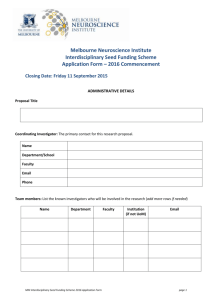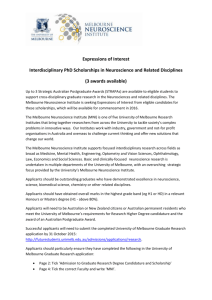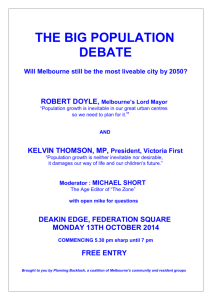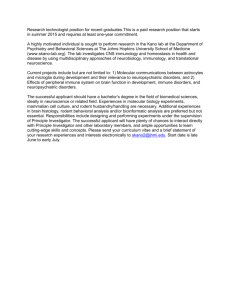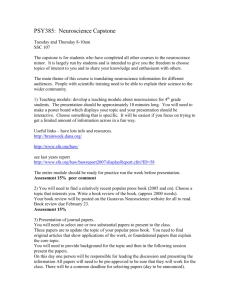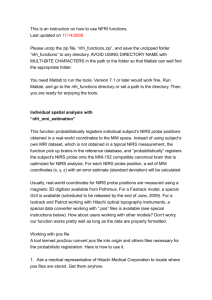Guidelines - Melbourne Neuroscience Institute
advertisement
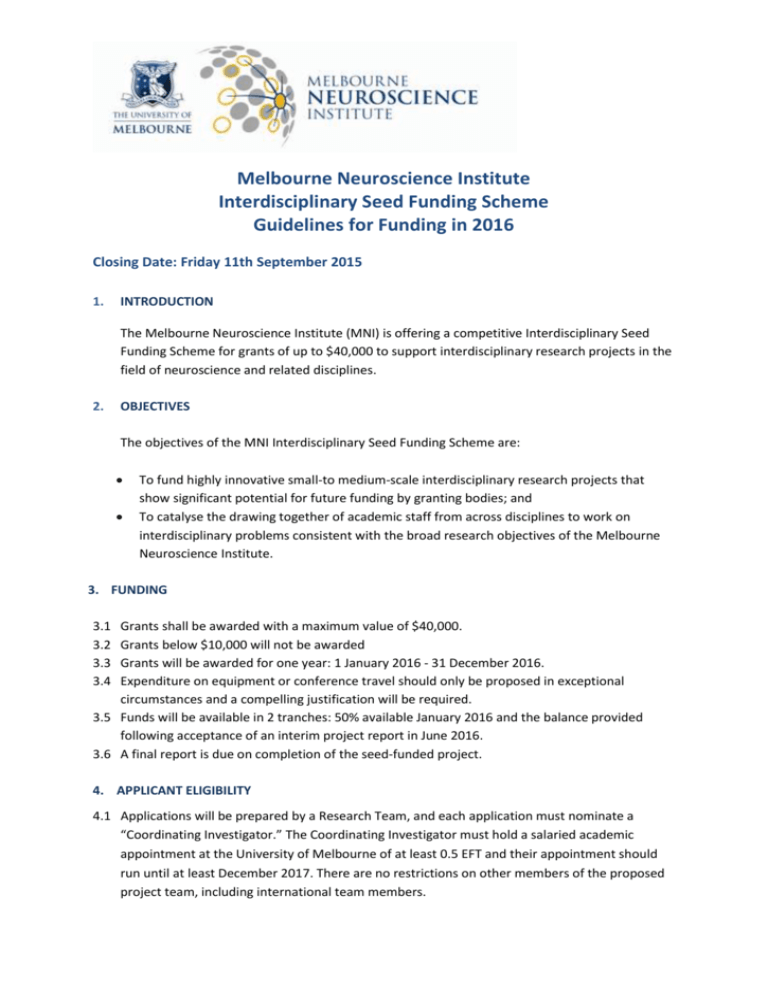
Melbourne Neuroscience Institute Interdisciplinary Seed Funding Scheme Guidelines for Funding in 2016 Closing Date: Friday 11th September 2015 1. INTRODUCTION The Melbourne Neuroscience Institute (MNI) is offering a competitive Interdisciplinary Seed Funding Scheme for grants of up to $40,000 to support interdisciplinary research projects in the field of neuroscience and related disciplines. 2. OBJECTIVES The objectives of the MNI Interdisciplinary Seed Funding Scheme are: To fund highly innovative small-to medium-scale interdisciplinary research projects that show significant potential for future funding by granting bodies; and To catalyse the drawing together of academic staff from across disciplines to work on interdisciplinary problems consistent with the broad research objectives of the Melbourne Neuroscience Institute. 3. FUNDING 3.1 3.2 3.3 3.4 Grants shall be awarded with a maximum value of $40,000. Grants below $10,000 will not be awarded Grants will be awarded for one year: 1 January 2016 - 31 December 2016. Expenditure on equipment or conference travel should only be proposed in exceptional circumstances and a compelling justification will be required. 3.5 Funds will be available in 2 tranches: 50% available January 2016 and the balance provided following acceptance of an interim project report in June 2016. 3.6 A final report is due on completion of the seed-funded project. 4. APPLICANT ELIGIBILITY 4.1 Applications will be prepared by a Research Team, and each application must nominate a “Coordinating Investigator.” The Coordinating Investigator must hold a salaried academic appointment at the University of Melbourne of at least 0.5 EFT and their appointment should run until at least December 2017. There are no restrictions on other members of the proposed project team, including international team members. 4.2 A simple sign-off process will be used. It will be assumed that in submitting an application, all project team members have consulted appropriately with their Heads and Deans and have the time and basic infrastructure resources to pursue the project concerned, within the context of existing research, teaching and higher degree supervision responsibilities. 5. NUMBER OF APPLICATIONS 5.1 Applicants may be involved in only one application as Coordinating Investigator, but may be participating Team Members on other applications. 6. RELATIONSHIP OF THE PROPOSAL TO OTHER PROJECTS 6.1 Because this scheme is intended to fund ground-breaking initiatives, applications which request funds to supplement other current internal University grants, external grants or research contracts will be excluded from consideration. However, proposals that are clearly an innovative and interdisciplinary niche within a larger program and that would be facilitated by an IDSF grant may be eligible. 7. EVALUATION AND ASSESSMENT 7.1 Evaluation 7.1.1 Applications that interface between pharmacology and neuroscience, in the context of precision medicine will be viewed favourably. For example, pre-clinical projects that facilitate drug discovery. 7.1.2 Applications with a disability theme are encouraged. 7.2 Assessment Process 7.2.1 Applications will be assessed on a competitive basis by a Grants Review Committee. 7.2.2 The Committee reserves the right to discuss applications with Deans, Associate Deans (Research), Heads of Department/School, or other senior colleagues, and reserves the right to seek further information from applicants before making a final decision. 7.2 Assessment Criteria Demonstrably innovative interdisciplinary research that would be facilitated and accelerated by this grant; Consistent with the broad research objectives of the Melbourne Neuroscience Institute; Involves a team of academic staff from relevant disciplines with appropriate and complementary expertise for the proposed research. Teams involving early career researchers will be viewed favourably; Shows significant potential for future funding by granting bodies; and Budget is aligned with proposed outcomes. 7.3 Assessment Metrics Potential of the investigators and the proposed project to advance the research team’s chance of future competitive grant success Interdisciplinarity of proposed project Track record of the research team, given opportunity Scientific quality of the proposed project Feasibility of the project – within the 12 month period 30% 10% 20% 30% 10% 8. APPLICATION PROCESS 8.1 An application will consist of three elements: 1. Administrative details – 1 page 2. Project Proposal – 2 pages 3. CVs – for each Team Member: A statement of no more than 1 page in total including: (a) current position, (b) expertise relevant to the proposed role in the current proposal, including track record of prior collaboration, and (c) a representative list of grants and/or publications in areas relevant to the proposal. 8.2 Applicants are expected to discuss their proposal with their Department Head or Nominee and with the MNI Director or Deputy Director. 8.3 Applications, including all the above documents, are to be submitted to Vikki Marshall, Melbourne Neuroscience Institute Operations Manager, by the closing date. Please submit your application by email to: research-mni@unimelb.edu.au Enquiries: Professor Trevor Kilpatrick Tel +61 83441804 Vikki Marshall vikki.marshall@unimelb.edu.au Tel +61 3 8344 8692 9. KEY DATES Applications Open: Information Session: Applications due: Advice of outcome: First tranche of funds available: Second tranche of funds available: Monday 27 July, 2015 Monday 3 August, 2015 Friday 11 September, 2015 November 2015 January 2016 June 2016 (pending receipt by MNI of interim report) 10. CONDITIONS OF GRANT 10.1 Grant Offers must be accepted in writing by the Coordinating Investigator and their Head of Department/School. 10.2 The Coordinating Investigator will be the contact person for all administrative matters to do with the project and is responsible for internal reporting requirements. 10.3 The Coordinating Investigator must ensure that the research is conducted in accord with University policy, including compliance with the Code of Conduct for Research and policies on human research ethics, animal experimentation ethics, requirements of the Office of Gene Technology Regulator, health and safety and intellectual property. No project may proceed unless the appropriate ethical or other required clearances have been obtained. 10.4 Funding is for one year only, commencing January 2016. Projects must be completed and funds expended by 31 December 2016. Extensions to this completion date will be considered only in exceptional circumstances, with a maximum extension date of 30 June 2017. Where exceptional circumstances exist, a written request must be approved by the Coordinating Investigator’s Head of Department, and submitted to the Director of the Melbourne Neuroscience Institute no later than 1 November 2016. 10.5 The Coordinating Investigator must comply with any instructions or conditions in the Offer of Grant relating to approved items of expenditure. 10.6 Unless special conditions are set down by the Committee, the grant should be regarded as a ‘one-line budget.’ The Coordinating Investigator is responsible for ensuring that the expenditure of the grant is broadly in accord with the budget presented in the application and is consistent at all times with the nature and aims of the specific project approved and the objectives of the Scheme. 10.7 The Coordinating Investigator will be required to provide written reports and presentations on the progress and outcomes of the project as requested by the MNI Director from time to time, with a formal final report required on the outcomes of the project within 3 months of the project’s completion. Summaries of projects funded and project final reports may be published. In addition, it is anticipated that at least one Showcase Event will occur during 2016 at which all funded projects will be required to report on progress. 10.8 Successful applicants are expected to provide appropriate acknowledgement of University support when communicating research outcomes. About the Melbourne Neuroscience Institute The Melbourne Neuroscience Institute (MNI) is one of five University-level interdisciplinary research institutes at The University of Melbourne. Its Director is Professor Trevor Kilpatrick. The core MNI team is located in the Melbourne Brain Centre (Parkville). The MNI is charged with focussing the University’s cross-disciplinary neuroscience research activities to optimise productivity and impact, increase funding for research in this area and to enable more efficient use of existing facilities and infrastructure. The Institute is responsible for enhancing interdisciplinary in neuroscience through stewardship of cross-faculty activities which involve collaboration with researchers from areas such as Medicine, Mental Health, Engineering, Optometry and Vision Sciences, Ophthalmology, Law, Economics, and Social Sciences. It aims to provide an international neuroscience research-based focus that attracts and retains talented researchers from around the world in addition to the best postdoctoral researchers and research higher degree students. The MNI is also charged with developing new research ventures to address significant gaps in the University’s knowledge base in the neurosciences. The Institute aims to enhance the University’s connectivity with the community, and with key stakeholders, in order to optimise research outcomes and knowledge transfer, as well as maximising the translation of neuroscience research to clinical outcomes. The Melbourne Neuroscience Institute supports endeavours undertaken by researchers within its four major themes, which include the Centre for Neural Engineering (CfNE), the Music, Mind and Wellbeing initiative, Stem Cells Australia (SCA) and the Melbourne Brain Centre Imaging Unit (MBCIU). The Institute works through a small core unit that draws together key researchers and administrators whose activities are enhanced to meet a broader objective, namely to promote interdisciplinary research in the Neurosciences across the University of Melbourne. By creating opportunities for links between the University’s researchers in areas such as diseases of the brain and mind, social context and health costs, the Institute strengthens University-wide responsiveness to neuroscience-related matters. The Institute is also able to provide a focused opportunity to collaborate with institutional, hospital and commercial partners, in order to maximise research outcomes, facilitate knowledge transfer and strengthen the standing of the University of Melbourne as a leader in research in the Neurosciences nationally and internationally. Governance of MNI is supported by an Advisory Board. The Advisory Board aims to ensure the MNI is aligned with important trends and provide avenues for interaction with those who might wish to commission or undertake research through collaborative interaction in the Neurosciences and related disciplines of research. The Board provides advice on research directions, business strategies and stakeholder linkages. www.neuroscience.unimelb.edu.au
